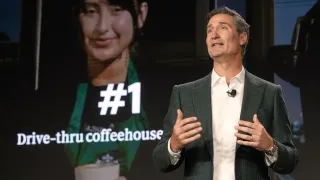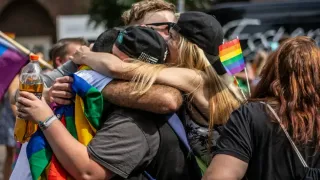February 19, 2017
SF LGBT Center Rolls Out #HireTrans Ad Campaign
Charlie Wagner READ TIME: 4 MIN.
A first-of-its-kind educational campaign to encourage employers to hire transgender and gender non-conforming workers can now be seen on Muni buses and downtown San Francisco BART stations.
The mass transit ads are the latest part of the San Francisco LGBT Community Center's #HireTrans campaign. It was conceived and designed by the center's Trans Employment Program and features printed posters - and an online video slide show - and can be seen through the end of March on hundreds of San Francisco Municipal Transportation Agency vehicles and stations, as well as in two BART stations.
Muni content includes 10 "bus queens," which cover the entire side of a bus, as well as 500 "car cards," which are positioned above the seats inside the buses.
BART content includes posters in the non-paid area of Civic Center station and a video slide show, or digital poster, on the platform level of the Montgomery station, one of the system's busiest.
San Francisco's Human Rights Commission has often partnered with SFMTA to provide public exposure for important issues and together the agencies arranged the donated ad space.
BART provided its ad space at reduced-rate pricing, according to a news release from the center.
Clair Farley, the center's director of economic development, told the Bay Area Reporter that printing and production costs were about $5,000.
Jennifer Louie, a marketing specialist for Intersection, which works with BART, said that they don't share client rates with the media.
The Trans Employment Program was launched by the LGBT center in 2007 as the Transgender Economic Empowerment Initiative, the first city-funded program to help transgender and gender non-conforming people get back to work and overcome the economic barriers facing their community.
"As trans people we are twice as likely to have a college degree but three times as likely to be unemployed. Nine out of 10 of us have experienced workplace harassment and discrimination," said Farley, a trans woman.
She cited research done by the National LGBTQ Task Force and the National Center for Transgender Equality as the source for these statistics, with supplemental data from the San Francisco HRC.
Farley pointed out that often there is a lack of awareness, even in the Bay Area, and that trans people face a unique challenge in "coming out to past (business) references."
The Trans Employment Program provides a wide range of services including job referrals, career coaching, resume review, managing references, mentoring, legal services, and moving from unemployment to joining the workforce.
"We want to be sure employers know they can come to us for employees," Farley said. "And the more 'interior' champions and allies the better. It's about networking."
The #HireTrans campaign is so named because, as Farley explained, "We want trans and GNC people to use social media to share their own experiences in the job market and in the workforce."
The campaign aims to make visible and highlight the challenges transgender jobseekers face in their search for employment and even in simply identifying inclusive workplaces.
The ads feature seven transgender individuals, identified by their first names, working in a range of professions, along with the pronouns they prefer to use: Alic (he, him), a pediatric oncology nurse; Caleb (he, him), a lawyer; Candy (she, her), a supervising coordinator; Frida (she, her, they, them), a health outreach worker; Mia (she, her), a director of a youth advocacy group; Miss Peaches Montrace (she, her), an entertainer; and Sophie (she, her), a data scientist.
Farley said the featured people were contacted via the Trans Employment Program and other channels.
"We wanted diversity and to include people not always represented," she said.
Samantha Cooper and Bob Stafford photographed the campaign.
Frida Ibarra, the health outreach worker, told the B.A.R. that she has yet to see her ad, which is at Civic Center BART.
"But it's been great to see so many folks snapping photos via social media and tagging me in them," she said. "It's been quite the ego booster, but also amazing to feel supported through a meaningful and important campaign."
Ibarra said the campaign has been "a ray of sunshine" in the current political climate.
"We are living in a time when trans representation matters, and the need to empower trans folks via viral campaigns is crucial in order to ensure we have the same career opportunities that cisgender folks have."
The transit campaign leads up to the March 31 Transgender Day of Visibility, which celebrates accomplishments and victories in trans and gender non-conforming people's lives. TDOV also seeks to raise awareness of the work still needed to save lives and address the staggering rates of discrimination, homelessness and underemployment.
In partnership with the Asian & Pacific Islander Wellness Center, the Trans Employment Program is hosting an event Friday, March 31 at 5:30 p.m. at SOMArts Cultural Center, 934 Brannon Street. The evening will include a reception, awards, and performances.
Farley is proud that in the last 10 years the Trans Employment Program has connected trans jobseekers with thousands of jobs in diverse and rewarding workplaces.
"We want trans and GNC people to feel empowered, that they are not alone, and that there are people who care about them," she said.
#HireTrans is searchable on Facebook, Instagram, Twitter and YouTube. For more information, visit http://www.transemploymentprogram.org or http://www.TDOV.org






